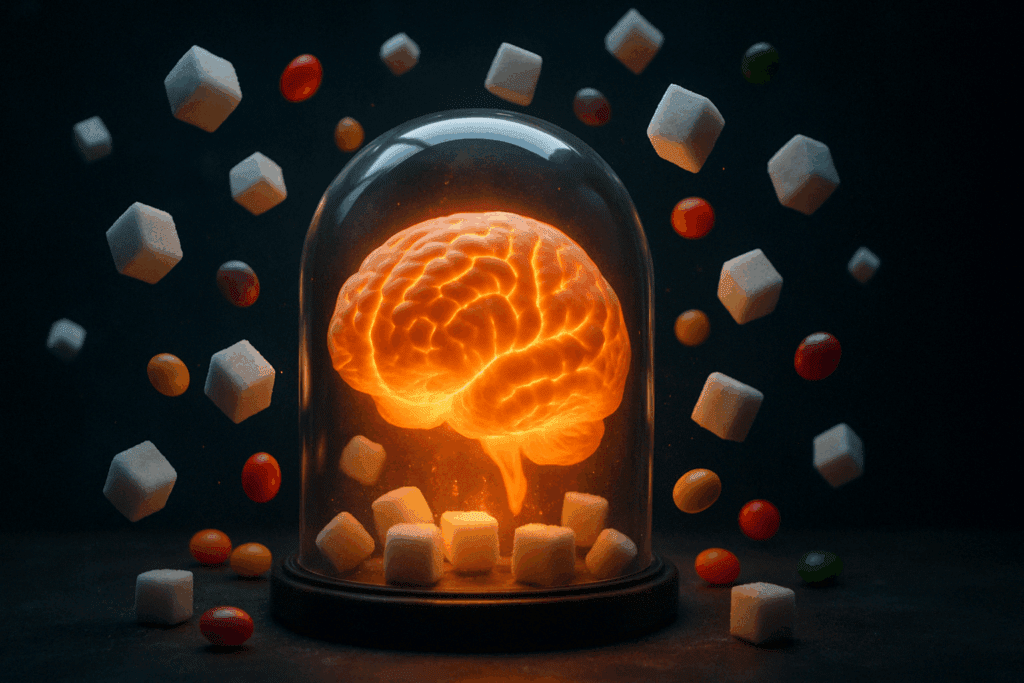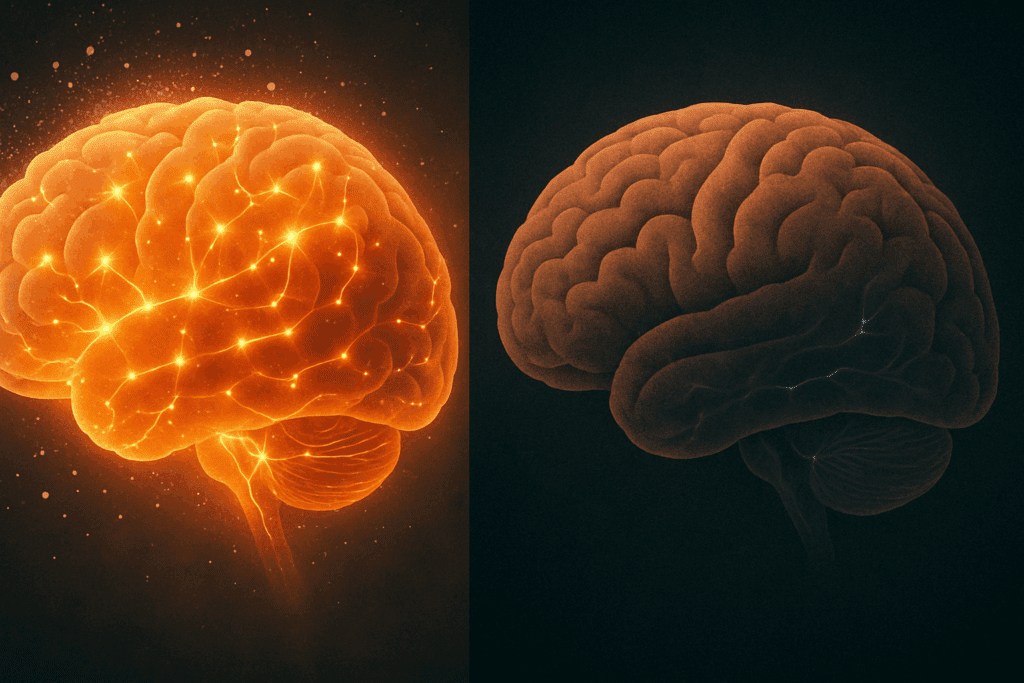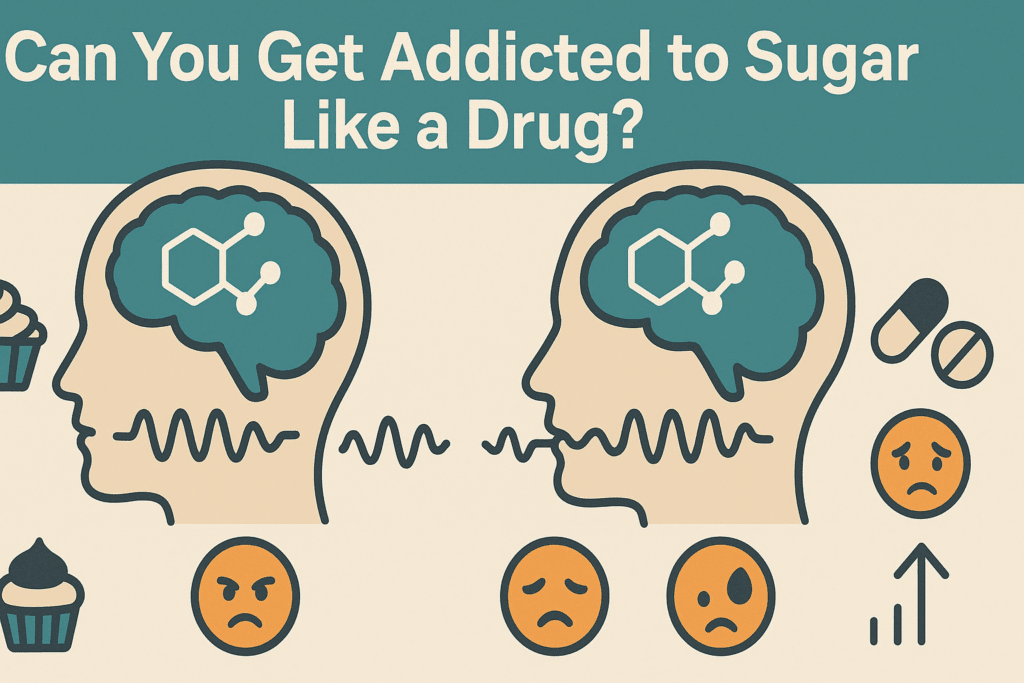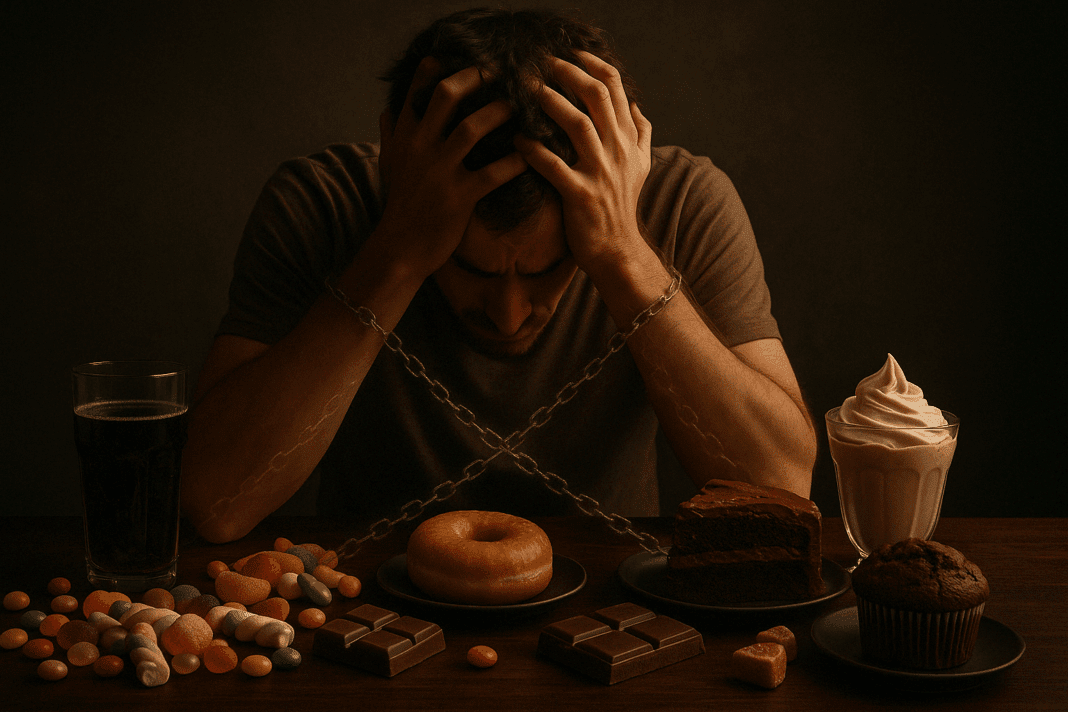Why It Matters: Sugar’s Hidden Grip on Our Lives
In the past, sugar was considered a harmless indulgence—something to enjoy in moderation at birthdays, holidays, or special celebrations. But today, we are exposed to sugar almost constantly. It’s in our breakfast cereals, salad dressings, sauces, energy bars, and even “healthy” yogurt. The consequences are showing up in the form of rising rates of obesity, metabolic syndrome, and mental health challenges. More people are now asking: is sugar addictive, and if so, what are the implications for personal and public health?
This article explores the mounting scientific and clinical evidence surrounding sugar dependency. It explains how and why some people become addicted to sugary foods, what the signs of sugar addiction look like, and how to escape the trap through evidence-based solutions. If you’ve ever struggled with cravings or wondered whether you’re simply indulging or suffering from sugar addiction symptoms, this is for you.
You may also like: Why Am I Craving Sweets All of a Sudden? Expert-Backed Reasons and How to Stop Sugar Cravings Naturally

What Does It Mean to Be Addicted to Sugar?
The term addiction typically brings to mind substances like alcohol, nicotine, or opioids. But behavioral health specialists and neuroscientists have found striking similarities between the way people respond to sugar and the way they respond to addictive drugs. This doesn’t mean sugar is equally dangerous, but it does suggest that for many people, it can become compulsive and psychologically disruptive. So when we ask, can you be addicted to sugar, the answer is increasingly supported by neuroscience.
When someone is addicted to sweets, it goes beyond enjoying dessert. The cravings become persistent, intense, and difficult to control. Eating sugar may provide temporary pleasure but is often followed by guilt, fatigue, or the inability to stop even after feeling full. This isn’t simply a bad habit—it reflects changes in the brain’s dopamine reward pathways that mimic those seen in other forms of addiction.
Recognizing sugar dependency symptoms is essential for moving from frustration to freedom. People often rationalize their behavior by saying they just have a “sweet tooth,” but when sugar consumption leads to negative consequences and still continues, it’s a red flag that something deeper is happening.

The Brain on Sugar: Why Is Sugar Addictive?
Sugar lights up the brain’s reward center with an intensity comparable to some addictive substances. When consumed, sugar triggers a release of dopamine—a feel-good neurotransmitter—creating a sense of pleasure and emotional relief. Over time, the brain begins to associate sugar with comfort, stress relief, and even identity, especially for those addicted to sugary foods from a young age.
The more frequently someone consumes sugar, the more their brain adjusts by reducing the number of dopamine receptors. This means they need more sugar to get the same rewarding feeling—a hallmark of addiction known as tolerance. This physiological process explains why sugar is addictive for many people. It’s not just about liking sweets; it’s about the brain being wired to crave them.
The addiction is also behavioral. Many people develop routines around sugar—using it to celebrate, to cope with anxiety, or to relax at night. These habits get reinforced and paired with emotional triggers, making it harder to stop even when the health consequences become obvious.

Recognizing Sugar Addiction Symptoms in Everyday Life
Not all sugar consumption is problematic, but if you notice a pattern of behavior that mirrors dependency, it may be time to take a closer look. People experiencing sugar addiction symptoms often report a loss of control over how much sugar they eat, consuming more than they intend or eating when not hungry.
Physical symptoms might include energy crashes after eating sweets, headaches when abstaining from sugar, and gastrointestinal discomfort after bingeing. Emotional symptoms are just as common—irritability, mood swings, anxiety, or even depressive states that improve after eating something sweet.
These signs of sugar addiction can also manifest behaviorally. Individuals may hide sweets from others, eat in secret, or make repeated unsuccessful attempts to cut back. When something that should be occasional becomes daily—or even hourly—it’s often a sign that sugar is functioning as a psychological crutch rather than a food.

Candy Addiction and the Culture of Overindulgence
It’s not just biology that keeps people hooked—it’s also society. Modern marketing glorifies sugar in ways that reinforce dependency. Candy, cookies, and desserts are associated with holidays, comfort, reward, and love. This creates an emotional context where cutting back on sugar can feel like giving up joy itself, making candy addiction harder to break than one might expect.
For people looking for candy addiction help, cultural norms pose a serious challenge. Offices are filled with free donuts. Birthdays and meetings revolve around cake and snacks. Even efforts to eat healthy are sabotaged by so-called “low-fat” foods that are secretly loaded with sugar.
What makes candy addiction especially problematic is that sugar isn’t treated like other potentially harmful substances. It’s socially accepted, inexpensive, and widely available. But just because something is legal and popular doesn’t mean it’s harmless—especially for those predisposed to addictive behaviors.

Can You Get Addicted to Sugar Like a Drug?
Researchers now recognize that sugar addiction symptoms share similarities with substance use disorders. Animal studies have shown that rats will work harder to access sugar than they will for cocaine. Human studies reveal how people exhibit withdrawal symptoms, including irritability and headaches, when they attempt to cut out sugar abruptly.
When people ask, can you get addicted to sugar, they are often comparing it to traditional addictions. While sugar may not create physical dependence in the same way opioids do, it absolutely fosters psychological dependence, compulsive use, and tolerance—key markers of addiction.
This matters because treatment for sugar addiction may require more than willpower or cutting back. Like other dependencies, it may demand support, structure, and even professional sugar addiction therapy to fully recover. Ignoring the problem only allows it to deepen.
Seeking Sugar Addiction Help: From Awareness to Action
The good news is that help is available—and recovery is real. The first step in addressing sugar addiction symptoms is developing awareness. Many people don’t realize just how much sugar they consume until they track it. Reading labels, recognizing hidden sugars, and becoming mindful of emotional triggers can provide valuable insights.
After awareness comes action. Effective sugar addiction help often includes dietary changes, such as replacing refined sugars with whole foods that stabilize blood sugar and reduce cravings. Protein, fiber, and healthy fats help balance mood and energy, making it easier to resist temptation.
Psychological support is also key. For those with emotional dependencies on sugar, cognitive-behavioral techniques can help reframe negative self-talk, reduce stress, and build new, rewarding habits. Whether through self-guided practices or professional sugar addiction therapy, recovery is a journey of healing—not deprivation.

Exploring Sugar Addiction Therapy as a Path to Recovery
When habits feel too deeply ingrained to change alone, sugar addiction therapy can offer a powerful path forward. This kind of therapy helps individuals understand the emotional roots of their cravings. Often, sugar becomes a way to cope with trauma, stress, or loneliness. Therapy offers a safe space to unpack these associations and develop healthier responses.
Different forms of therapy may be helpful. Cognitive-behavioral therapy (CBT) teaches clients how to identify negative thought patterns and replace them with constructive ones. Mindfulness-based eating interventions help individuals build awareness around hunger, satiety, and emotional triggers.
Group support and accountability can also be transformative. Knowing that others are on the same path reduces shame and creates a sense of community. For some, nutritional counseling from specialists trained in food addiction can round out a holistic approach to overcoming sugar dependency symptoms.
Searching for the Sugar Addiction Cure: What Does Healing Look Like?
Is there a sugar addiction cure? While there may not be a one-size-fits-all answer, many people do experience full recovery. They break the cycle of cravings, reclaim control over their choices, and even lose the desire for sugar altogether. The cure is not a magic pill—it’s a shift in mindset, lifestyle, and identity.
Healing often begins when individuals stop viewing sugar reduction as punishment and start seeing it as empowerment. Instead of restriction, they embrace nourishment. They choose foods that support energy, mood, and metabolism, and they build lives filled with meaning that no longer revolve around the next treat.
Over time, taste buds recalibrate, energy stabilizes, and emotional regulation improves. Many who were once deeply addicted to sweets come to view sugar as something they no longer need. Their health improves, their mental clarity returns, and their self-confidence grows—not because they gave something up, but because they reclaimed something even greater: their well-being.
Frequently Asked Questions: Sugar Addiction, Symptoms, and Solutions
1. How do emotional patterns influence sugar dependency symptoms?
Emotional patterns play a significant role in developing and maintaining sugar dependency. People who experience chronic stress, loneliness, or unresolved trauma often turn to sugar as a temporary mood enhancer. This is where the most persistent sugar dependency symptoms emerge—not just from habit, but from deep-rooted emotional needs being met through sweet foods. Emotional conditioning can cause individuals to associate sugar with safety or love, making it much harder to break the cycle. Addressing these triggers through mindfulness and emotional regulation techniques can offer powerful sugar addiction help that goes beyond nutrition alone.
2. Can you be addicted to sugar without eating obvious sweets like candy or desserts?
Yes, and this is a commonly overlooked problem. Many individuals are addicted to sugary foods even when they don’t consume traditional sweets like cookies or chocolate. Hidden sugars in processed items such as sauces, breads, flavored yogurts, and “healthy” snacks can fuel the same addictive behaviors. Over time, even these subtler sources can produce the signs of sugar addiction, including cravings, irritability, and fatigue after meals. Being aware of ingredient labels and understanding terms like “evaporated cane juice” or “maltodextrin” is essential in recognizing and reversing this quiet form of sugar addiction.
3. Why is sugar addictive for some people but not others?
The question of why is sugar addictive for some and not for others comes down to a complex interplay of genetics, gut health, childhood exposure, and psychological resilience. Some individuals may have a naturally lower dopamine threshold, making them more sensitive to sugar’s reward signals. Others may have been raised in environments where sugar was used as a pacifier or reward, laying a behavioral foundation for later dependency. People with imbalanced gut microbiomes may also crave sugar more frequently, as certain bacteria thrive on glucose. This diversity explains why sugar addiction therapy often takes a highly individualized approach to be effective.
4. What are the long-term effects of untreated sugar addiction symptoms?
If left untreated, sugar addiction symptoms can evolve into more serious health issues beyond weight gain or fatigue. Insulin resistance, type 2 diabetes, fatty liver disease, and chronic inflammation are all long-term consequences linked to excessive sugar intake. Psychological effects can also become pronounced—mood instability, anxiety, brain fog, and even depressive episodes have been associated with chronic sugar overuse. Individuals addicted to sweets often experience disrupted sleep patterns and poor impulse control over time. Addressing these issues early through sugar addiction help is vital not only for physical health but for emotional and cognitive well-being as well.
5. What is the difference between candy addiction and general sugar dependency?
While candy addiction may seem like a lighthearted term, it reflects a very real issue. Unlike general sugar dependency—which may stem from overall high-sugar diets—candy addiction often involves psychological rituals, such as always keeping candy nearby or bingeing during emotional lows. Candy, with its concentrated doses of refined sugar and artificial additives, creates an especially fast and potent dopamine response. This can intensify the addictive cycle compared to other sources of sugar. People seeking candy addiction help often benefit from cognitive behavioral strategies focused on breaking habitual behaviors and learning to self-regulate more consciously.
6. What role do hormones play in becoming addicted to sweets?
Hormonal imbalances—especially involving insulin, cortisol, and leptin—can strongly contribute to being addicted to sweets. When insulin spikes frequently due to high sugar intake, it disrupts the body’s ability to regulate blood sugar effectively, leading to recurring crashes and cravings. Elevated cortisol levels, often caused by chronic stress, increase appetite and specifically heighten the desire for high-sugar foods. Leptin resistance, which occurs in some individuals with obesity or metabolic syndrome, further dulls satiety signals, encouraging overeating. Addressing hormonal imbalances is an essential but often overlooked aspect of effective sugar addiction therapy.
7. Can sugar addiction be passed down or influenced by family habits?
Yes, there is growing evidence that sugar-related behaviors can be inherited or modeled during early development. Children raised in households with frequent access to sugary snacks are more likely to become addicted to sugary foods themselves. Parental attitudes—such as using candy as a reward or withholding sweets as punishment—can create emotionally charged relationships with sugar. Even in utero exposure may play a role, as studies suggest that mothers with high-sugar diets may prime a child’s taste preferences. Breaking intergenerational cycles often requires family-wide education and participation in sugar addiction help strategies.
8. What is the most overlooked sign of sugar addiction in adults?
While cravings and energy crashes are often recognized, one of the most overlooked signs of sugar addiction is the normalization of poor sleep and irritability. Adults who are addicted to sweets may not realize that their restless nights, grogginess, or midday anxiety are directly tied to their sugar habits. These symptoms are frequently misattributed to stress or aging. Yet when sugar is removed, people often report feeling dramatically better within days—more focused, emotionally stable, and well-rested. Understanding this connection can be a breakthrough moment for those seeking a long-term sugar addiction cure.
9. Are there any supplements or tools that help with sugar addiction therapy?
While no supplement can replace behavioral change, some natural aids may support the process of sugar addiction therapy. Chromium and magnesium have been studied for their roles in stabilizing blood sugar and reducing cravings. Adaptogens like ashwagandha may help regulate cortisol levels, easing stress-related urges for sweets. Additionally, mindfulness apps, journaling, and nutrition trackers can offer accountability and insight. These tools work best as part of a broader approach that includes emotional support, dietary changes, and addressing sugar dependency symptoms holistically.
10. What does recovery from sugar addiction actually look like in real life?
Recovery is less about perfection and more about freedom. Most people who successfully overcome sugar addiction symptoms report that they no longer feel controlled by cravings or emotionally reliant on sweet foods. They may still enjoy the occasional dessert, but it’s a conscious choice rather than a compulsion. Over time, taste buds adjust, and whole foods begin to taste sweeter. Individuals who once wondered can you get addicted to sugar often find that not only is it possible, but the journey to recovery opens up a better quality of life—more energy, better mood, improved digestion, and a deeper connection to body awareness. Whether through support groups, lifestyle changes, or formal sugar addiction help, healing is achievable and often transformative.
Conclusion: Is Sugar Addictive? The Answer Is Clear—and So Is the Path to Freedom
After reviewing the evidence, both scientific and personal, the answer to the question is sugar addiction becomes unmistakably clear. For many individuals, sugar acts like an addictive substance—triggering cravings, disrupting behavior, and causing emotional and physical distress. Recognizing the signs of sugar addiction is not a matter of weakness but one of self-awareness and health literacy.
The path to recovery requires patience, support, and strategy. From recognizing sugar dependency symptoms to seeking sugar addiction help, people can heal by addressing both the biological and emotional components of addiction. For those needing more support, sugar addiction therapy offers structured, personalized guidance that can lead to long-term transformation.
While there may not be a singular sugar addiction cure, there is hope—and it lies in reclaiming your health, your energy, and your relationship with food. By choosing to nourish rather than numb, and by replacing habit with intention, freedom from candy addiction becomes not just possible, but empowering. If you’ve ever asked yourself, can you be addicted to sugar, know that you’re not alone—and that breaking free is one of the most life-affirming decisions you can make.
Was this article helpful? Don’t let it stop with you. Share it right now with someone who needs to see it—whether it’s a friend, a colleague, or your whole network. And if staying ahead on this topic matters to you, subscribe to this publication for the most up-to-date information. You’ll get the latest insights delivered straight to you—no searching, no missing out.
Further Reading:
Sugar addiction: the state of the science
How To Break Your Sugar Addiction
Slideshow: The Truth About Sugar Addiction
Disclaimer
The information contained in this article is provided for general informational purposes only and is not intended to serve as medical, legal, or professional advice. While NewsHealthWatch strives to present accurate, up-to-date, and reliable content, no warranty or guarantee, expressed or implied, is made regarding the completeness, accuracy, or adequacy of the information provided. Readers are strongly advised to seek the guidance of a qualified healthcare provider or other relevant professionals before acting on any information contained in this article. NewsHealthWatch, its authors, editors, and contributors expressly disclaim any liability for any damages, losses, or consequences arising directly or indirectly from the use, interpretation, or reliance on any information presented herein. The views and opinions expressed in this article are those of the author(s) and do not necessarily reflect the official policies or positions of NewsHealthWatch.

